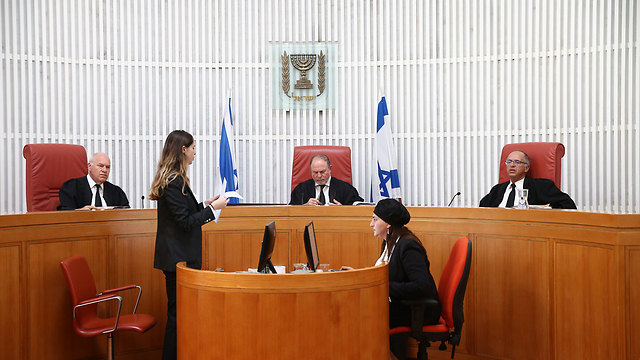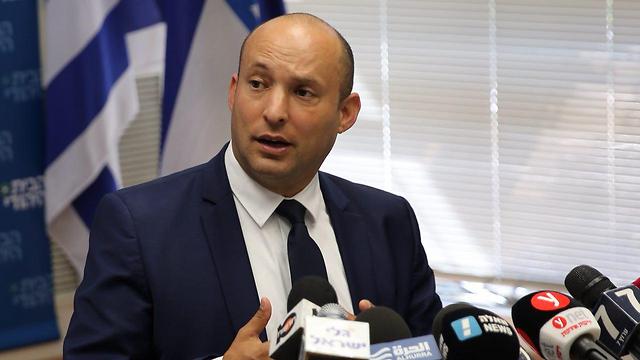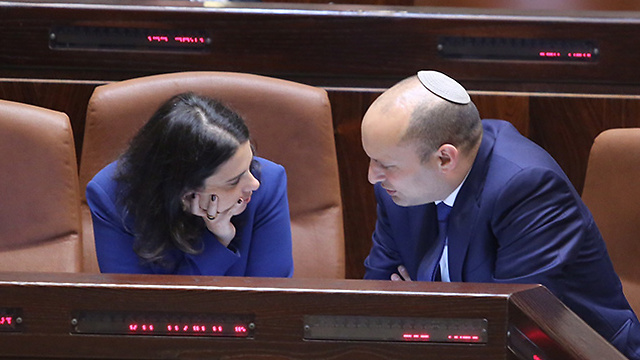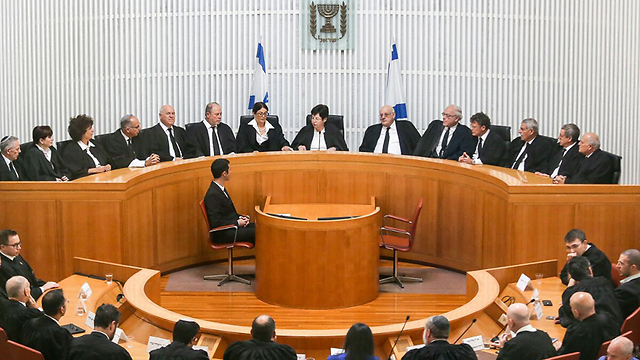
Basic Law proposal seeks to limit Supreme Court's ability to strike down laws
Under legislation proposed by Bennett, Shaked, the High Court could only strike down a law with a nine-judges panel and a two-thirds majority; it won't be able to strike down laws deviating from Basic Laws, and a 61 MK majority could reinstate laws disqualified.
Justice Minister Ayelet Shaked and Education Minister Naftali Bennett are pushing a new Basic Law that would limit the Supreme Court's ability to disqualify laws passed by the Knesset.
The bill stipulates the Supreme Court would only be able to strike down a Knesset law with a panel of nine justices or more and a two thirds majority.
Opponents argue the proposal would allow lawmakers to bypass the court when politically convenient. The Supreme Court and the attorney general are expected to strongly oppose Bennett and Shaked's proposal.

"The High Court of Justice has turned the Knesset into a useless vessel," Bennett told Ynet on Wednesday.
The proposed Basic Law: Legislation sets out to determine and regulate the relationship between the Knesset and the Supreme Court. It would be the first time the Knesset officially recognizes the court's authority to annul laws, a controversial matter which is not embedded in any law but rather based on a ruling by the Supreme Court itself.
The legislation would specify in what cases the Knesset can override a court's decision to annul legislation.
"You won't find anywhere (in law) that anyone authorized the High Court to strike down laws. It doesn't exist," Bennett said. "And yet the court has given itself the right over the past 30 years to disqualify quite a few laws. This is unacceptable."
The education minister went on to say that "Four million go out to vote in elections, the MKs work on a law for a year—and then the judges cancel it. Does this sound reasonable to you? The annulment of a law should only happen in a very rare case of extreme government tyranny."
As an example, he raised Finance Minister Moshe Kahlon's law to tax owners of three or more apartments. "The High Court came and cancelled this law. What is this? Who gave it the right? Why bother even having elections?" he said.
Since all coalition parties hold veto power, it is highly unlikely the proposal could pass in the current government. Moshe Kahlon (Kulanu) has repeatedly stated he would oppose any attempt to harm the Supreme Court and is expected to veto the bill in its current form. "It has no chance," said a Kulanu source.
The Bayit Yehudi Party is aware of the difficulties in passing the bill in the current term, but is hoping to include it in its coalition agreement with the next government so it would pass in the next term.
The bill also seeks to fortify existing Basic Laws against changes by a chance (as opposed to absolute) majority of MKs.
Bennett and Shaked are also hoping to restrict the court's ability to strike down any legislation that is a derivative of the Basic Law such as Basic Law: The State Budget, leaving only regular legislation vulnerable to the court.
The Supreme Court has always supported a Basic Law that would recognize its authority to annul legislation. But it also strongly opposes giving the Knesset power to enact laws with only a thin majority of 61 MKs, a state of affairs that holds the court hostage to the whims of the coalition.
The Supreme Court believes that legislation should require a minimum of 75-80 supporting MKs in order to pass. It also wants to minimize the Knesset's ability to enact legislation meant to bypass the court.
In their proposal, Shaked and Bennett write that the bill comes on the heels of "a series of controversial judicial interferences in legislation and government decisions," citing the court's decision to strike down certain clauses in the Anti-Infiltration Law, annulling the law to tax owners of three or more apartments and laws relating to the budget and the IDF draft.
In addition to the requirement that only a two-thirds majority of a nine panel Supreme Court can overrule legislation, as opposed to a mere panel of three, the proposed bill recognizes the court's authority to do so but with a series of stringent conditions.
A law would have to deviate from one of the Basic Laws for the court to annul it. Furthermore, if the law passed its third plenum reading with the necessary majority, the court could not strike it down.
The bill includes a clause whereby if the court rescinds a law, the Knesset can legislate it anew with a slim majority of 61 Knesset members, out of a total of 120. The law will then be valid for a period of five years with an option to extend.
Any judicial authority finding flaw with a new law can challenge it at the High Court in two phases: a three judge panel will examine whether there is merit in the legal challenge, and if they find there to be, the case will go before a nine judge panel.
Submissions of Basic Law proposals can only be presented by the government, the Knesset Constitution and Law Committee or a minimum of 20 MKs. A majority of 61 MKs will be necessary at each of its three readings and the third reading must take place during a special Knesset session.
"The necessity of this bill comes after a series of High Court rulings that violated the longstanding status quo between the legislative and judicial branches of government," Bennett and Shaked write in their proposal.
"Over the last year, citizens and legal experts have been shocked by the court's initiatives to revoke legislation on mere procedural grounds, unlike in the past when the court intervened only on substantial matters. For the first time, the court rescinded a clause of a Basic Law," they added.
They were also concerned with the court's seeming disregard for the Basic Law clause that enshrined aspects of the Zionist character of the state, such as the Law of Return.
Before submitting the bill, Bennett declared: "Today we tell the court, not everything is subject to adjudication. In recent years, the court has annulled government legislation too easily. The government ought to govern and the judges ought to judge. (This bill) will elucidate the boundary between the branches of government."
Shaked criticized the judicial activism that has "harmed Israeli democracy and usurped the people's right to choose… From the current judicial chaos there will be order and a balance will be achieved between the three branches of government," she said.
Former Justice Minister Tzipi Livni (Zionist Union) called the proposed bill "the fulfillment of Bayit Yehudi's threat to take a D9 bulldozer to the Supreme Court and part of a plot to harm Israel's gatekeepers, their goal is that there should be no one to stop them from turning Israel into an undemocratic bi-national state."
Ilan Gilon, chairman of the Meretz Party, asserted that "Bennett and Shaked are continuing to destroy Israeli democracy… We must now stand guard to protect a strong and independent judiciary."
Other MKs from the Zionist Union as well as Yesh Atid expressed opposition to the bill, calling it demagoguery, and saying the Bayit Yehudi MKs are trying to "destroy the Supreme Court" with anti-democratic legislation under the guise of sorting out the branches of government; and that they are conducting a destructive revolution.













